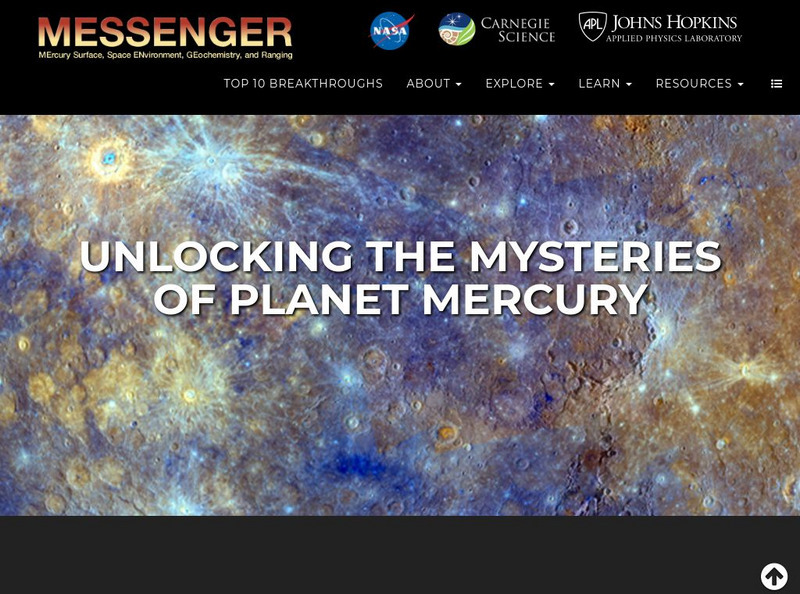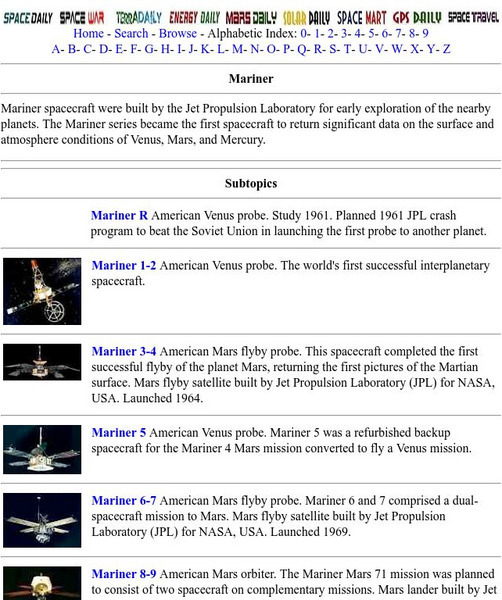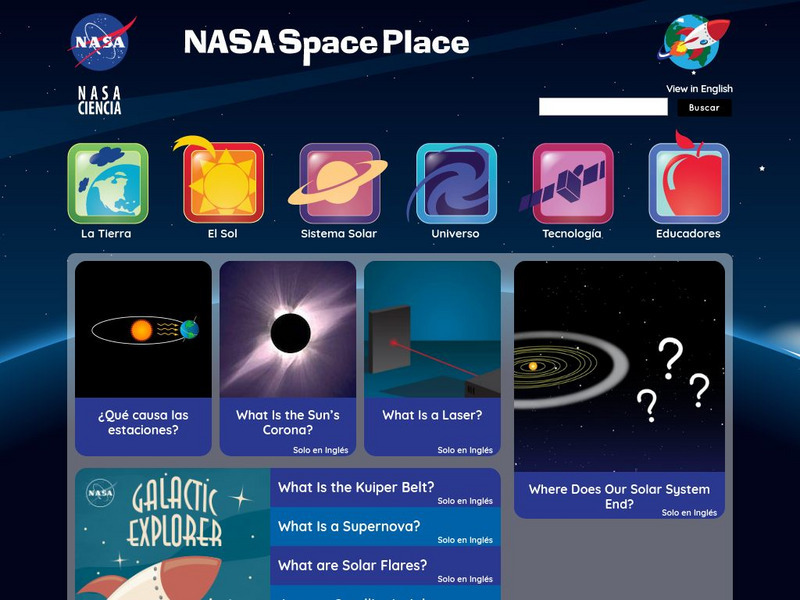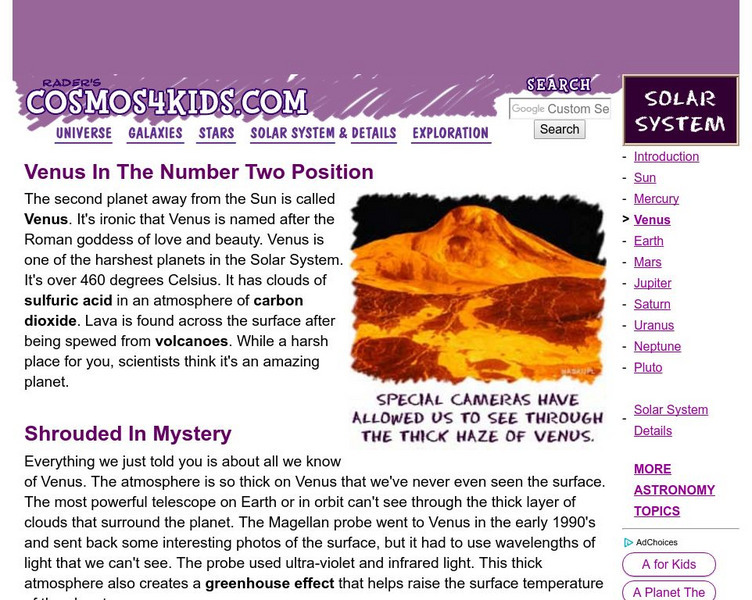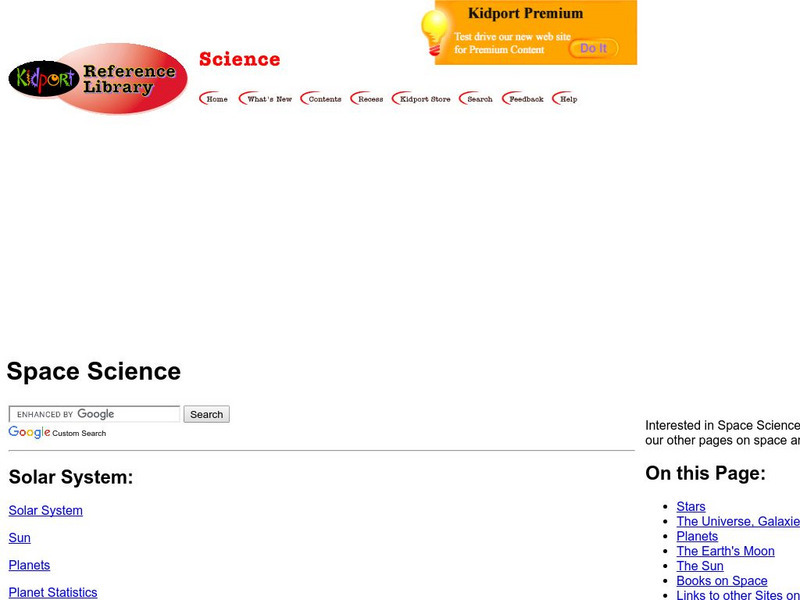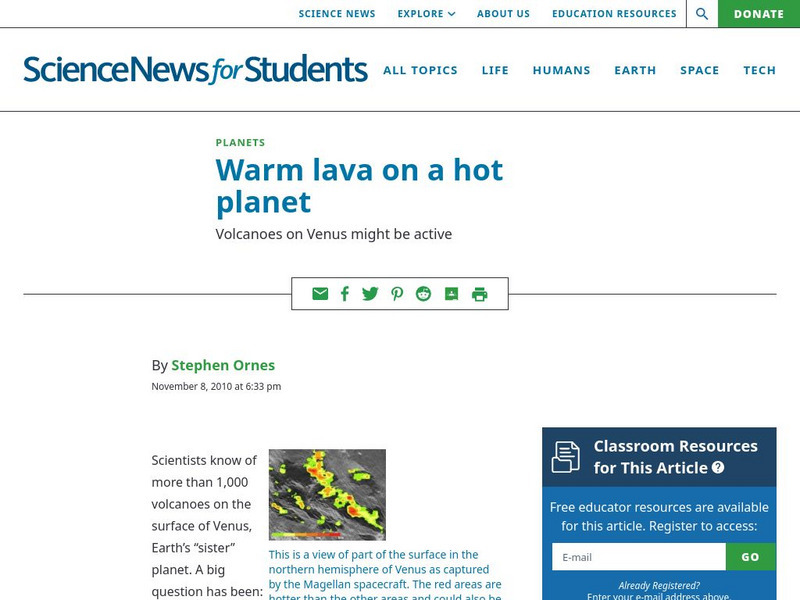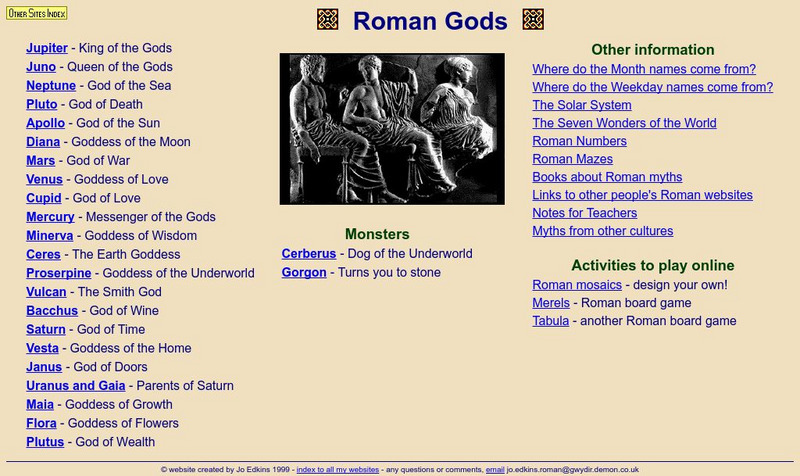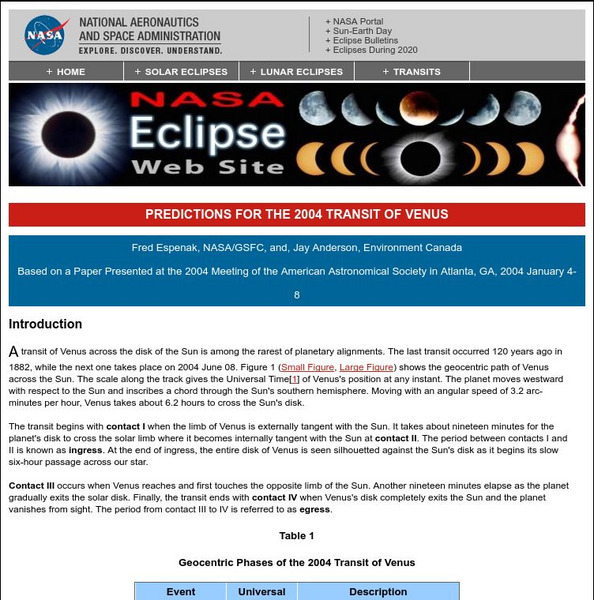NASA
Nasa: Image Science Center: Ask the Space Scientist
A NASA scientist, Dr. Sten Odenwald, answers many students' questions. Topics include planets, galaxies, black holes, the origin of the universe, and common misconceptions about space.
Johns Hopkins University
Applied Physics Laboratory: Messenger Home
Home page for NASA's Discovery Program Messenger to the planet Mercury. Site provides details of the planned mission, its experiments and the science and management teams. Linked Quicktime animation files are very large and detailed....
Other
Encyclopedia Astronautica: Mariner
This web page contains information about Mariner I and Mariner II. The page explains how Mariner II was the first spacecraft to successfully fly by another planet. Includes detailed chronology of the Mariner missions.
Sophia Learning
Sophia: The Transit of Venus
When Venus comes directly between the Earth and the Sun, it is called a transit. During the transit, the planet Venus blocks out a portion of the Sun's image, appearing as a black dot on the face of the Sun. Over time, the black dot...
NASA
Nasa Space Place: El Space Place
NASA's space science site for kids - en Espanol. Features a wide range of activities, including games, projects, animations, and more. Also contains useful information on basic physics, chemistry, and other natural sciences, offering...
NASA
Nasa Star Child: Space Probes to Venus
A brief discussion of the space probes that have reached the planet Venus.
Other
University of Leicester: The Solar System
Resource explores the solar system, with an in depth discussion of each of the planets and their properties.
NASA
Nasa Space Science Data Archive: Galileo Project Information
This is the homepage of all of the archived information about and from the Galileo Mission. Included is data from the flybys of Venus, Earth, Moon, and Asteroids Gaspra and Ida, as well as the current data from Jupiter and its moons. See...
Enchanted Learning
Enchanted Learning: The Planets
This survey of the planets includes all the basics, size, mass, atmosphere, length of day, and the like. It features interactive activities and learning exercises and compares all of the planets in colorful tables.
NASA
Nasa: Solar System
This resource provides a general overview of all the planets in the solar system, as well as the sun, various comets and asteroids, the deep space network, and the latest solar system news.
NASA
Nasa: Solar System Exploration: Planets: Venus
Comprehensive look at the planet Venus, with many useful facts, figures, photos, and related links. Provides an account of how Venus got it's name and a timeline of significant dates.
NASA
Nasa: Solar System Exploration
Enter our solar system to interact with the planets, moons, asteroids, meteors, and more. Investigate with NASA scientists and explore missions related to space exploration. Read facts, compare statistics, look through resources, and...
BBC
Bb Ci Space: Solar System
Take a journey through the solar system with this interactive guide. Includes planetary history, "travel information," "tourist highlights," and video clips. Games and quizzes include a Solar System jigsaw that prompts the student to...
NASA
Nasa: Solar System Exploration
This stunning site on the solar system gives a great overview of the planets and our sun. Learn about each object's size, vital statistics, and moons. Then go on for a more in depth look at these objects in the column on the left.
Cosmos 4 kids
Cosmos4 Kids: Solar System: Venus
Learn the basic facts about the planet Venus. The brief, to the point text makes this site most suitable for younger researchers.
Nine Planets
The Eight Planets: Just for Kids
Here is a clear, simple picture of the solar system. Click on the names of the planets to learn more about each. Clicking on underlined terms takes you to more and more detailed scientific information.
Kidport
Kidport: Space Science
This complete resource will help students to improve their understand of space exploration. Includes images of the universe, galaxies, stars and planets.
Society for Science and the Public
Science News for Students: Warm Lava on a Hot Planet
Describes scientific research into volcanic activity on the surface of Venus. Using information transmitted from the orbiting Magellan spacecraft, data is collected. Includes a glossary of vocabulary terms. [ November 8, 2010]
American Association of Physics Teachers
Com Padre Digital Library: Open Source Physics: Phases of Venus Model
A simulated activity examining the phases of Venus introduced in the Copernican system and derived from the Ptolemaic system.
PBS
Pbs Learning Media: The Planets of the Solar System
As technology has advanced, so do our views and understanding of the solar system. No longer do we have to rely on our unaided eyes to observe planets. View these high-quality images of planets provided by NASA spacecraft.
Other
University of Cambridge: Astro Adventure
Imagine a time when you can travel through space, planet to planet, cheaply and in comfort, when you can take a trip to the stars as your next holiday. Well, imagine no more. Learn more about the solar system as you take this trip of a...
Other
Canal Kids: Ciencias (Science for Portuguese Speakers)
Colorful, engagingly written information about astronomy and biology for Portuguese-speaking English language learners. Both subjects are broken down into a broad array of related subtopics. The biology section is particularly helpful...
Other
Roman Gods
This is an awesome site to research Roman gods. Find out about these Roman icons. This site lists each of the gods and then by clicking on the name you get more in depth information.
NASA
Nasa: Predictions for the 2004 Transit of Venus
NASA site provides detailed information on the 2004 transit of Venus across the sun. Also explores the modern value of Venus transits and how they aid in the study of astronomy.



